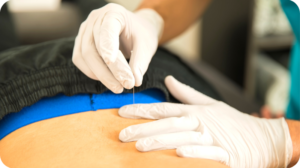An emerging diagnostic tool shows incredible promise for early cancer detection. Known as a “liquid biopsy,” this is a simple blood test that screens for cancer cell DNA fragments in the bloodstream, as well as other markers of the disease. Unlike a surgical or needle biopsy, a liquid biopsy is quick, painless, and far less invasive.

First developed in the early 2000s, this technology initially screened for one or two cancers only. Newer versions offer broader detection, and companies continue to develop the technology with the goal of one day having an all-cancer detection method that could change the landscape of cancer care.
That’s because cancer often doesn’t make itself known until it’s advanced. That means that patients commonly don’t get diagnosed—or treated—until the chances of survival are much lower than they would have been with early detection. With almost all cancers, early detection is key to rapid treatment and statistically far better outcomes and survival rates.
Although colorectal cancer screening is now a common practice with in health checkups for individuals over the age of 45, many cancers still go undetected because they require invasive biopsies that aren’t regularly done.
A liquid biopsy blood test, on the other hand, can theoretically detect even minute traces of cancer and could feasibly be included in a yearly blood panel as part of a routine physical exam. Although currently used predominantly to check cancer patients in recovery (they are an amazingly fast and easy way to detect recurrence earlier than ever before), these tests could be preemptive screening for all adults.
Types of Liquid Biopsies
All of these tests rely on the fact that both healthy and unhealthy cells die off and circulate in the blood stream until they are eliminated. Most liquid biopsies measure the amount of cancer cellular DNA material. Due to the expense, liquid biopsies are usually only performed as follow-up to a cancer diagnosis and/or treatment.
- CellSearch Circulating Tumor Cell (CTC) test. This is one of the earliest liquid biopsies developed, and is currently used to screen for metastatic breast, prostate, or colorectal cancers. The test doesn’t just detect cancer cell DNA, it also measures levels to provide a relative prognosis for treatability and cancer staging.
- Guardant360 CDx. This test focuses on breast and lung cancers and is typical of the diagnostic complexity liquid biopsies offer. Guardant360 not only detects circulating cancer cell DNA fragments, it also involves “comprehensive genomic profiling” that reveals specific genetic variants of the disease. This information allows for a more fully informed and targeted treatment plan.
- FoundationOne Liquid CDx. This test measures a range of blood tumor markers and touts itself as the “most comprehensive FDA-approved liquid biopsy on the market. It measures a range of biomarkers to identify specific genetic types of prostate, breast, and colorectal cancers.
- Grail. Grail developed their Galleri as a wide spectrum Multi-Cancer Early Detection (MCED) test that identifies, according to the company, biologic “signals” shared by 50 cancers. This makes it the test meant to detect the most diverse group of cancers.
The biomarkers in most of these tests allow for precisely targeted treatment strategies that are more efficacious and limit side effects. Keep in mind, however, that all experience a certain number of false positives and false negatives (the percentage varies test to test). Liquid biopsies are increasingly covered by Medicare and insurers.
If you suspect one of these tests might be useful in your particular case, consult with your primary healthcare provider and discuss which might be the right test for you, and how you’ll treat the information the test provides.







